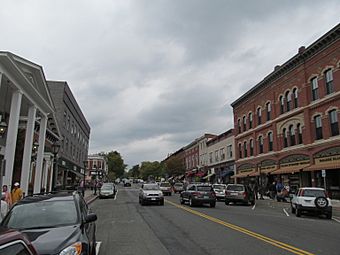Lower Main Street Historic District (Lee, Massachusetts) facts for kids
Quick facts for kids |
|
|
Lee Lower Main Street Historic District
|
|

Main Street view
|
|
| Lua error in Module:Location_map at line 420: attempt to index field 'wikibase' (a nil value). | |
| Location | Roughly, area surrounding Main and Park Streets, Lee, Massachusetts |
|---|---|
| Area | 15 acres (6.1 ha) |
| Architectural style | Romanesque, Late 19th And 20th Century Revivals, late Victorian |
| NRHP reference No. | 09000090 |
| Added to NRHP | March 26, 1976 |
The Lower Main Street Historic District in Lee, Massachusetts is like a special time capsule! It's the old heart of the town, right where Main Street and Park Street meet. This area was first planned way back in 1760. Long ago, there was a meeting house here, but it became a lovely town common (a public park) that people still enjoy today. This district also includes part of the town's main shopping area along Main Street. It was added to the National Register of Historic Places in 1976 because of its important history.
Discovering Lee's Historic Center
The town of Lee began in 1760 and became an official town in 1777. Its economy grew a lot in the 1800s. First, it was known for making paper. Later, around the 1850s, marble quarrying became very important.
Lee's Famous Marble
The marble from Lee was so special that it was used in famous buildings. Imagine, parts of the United States Capitol and the Washington Monument were built with marble from this very town! Sadly, many of Lee's paper mills were destroyed by a big flood in 1886. In the 1900s, the town's economy changed again. It started to focus more on tourism, with people visiting to see its beauty and history. The town center, especially around Main and Park Streets, still shows off how rich and busy Lee was in the 1800s.
Buildings Around the Park
The most important part of the historic district is the oval-shaped town park. You can find it at the corner of Park and Main Streets. This park is where Lee's very first church was built in 1780. Today, the beautiful Romanesque First Congregational Church, built in 1858, stands overlooking the park.
Also facing the park is Memorial Hall, built in 1874. This building holds town offices and court facilities. It also serves as a special memorial to the people from Lee who fought in the American Civil War. As you walk north from the park, you'll see many commercial buildings made of stone. Most of these were built between 1850 and 1900. They were often built by business owners who worked in the marble or papermaking industries. You can even see local Lee marble used in some of these buildings, including the public library.
 | Lonnie Johnson |
 | Granville Woods |
 | Lewis Howard Latimer |
 | James West |

